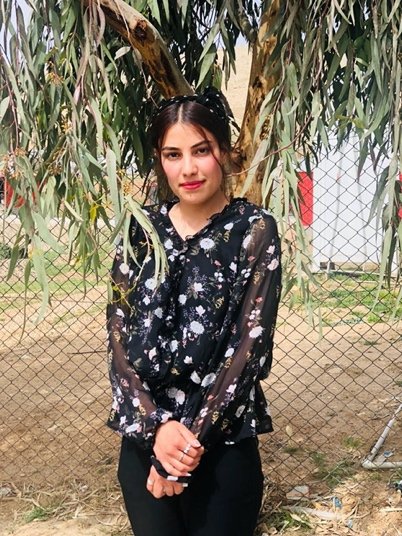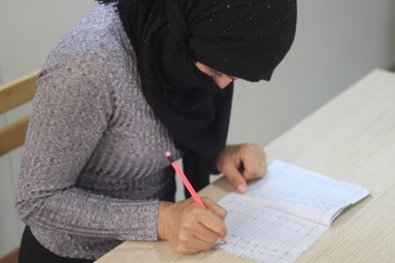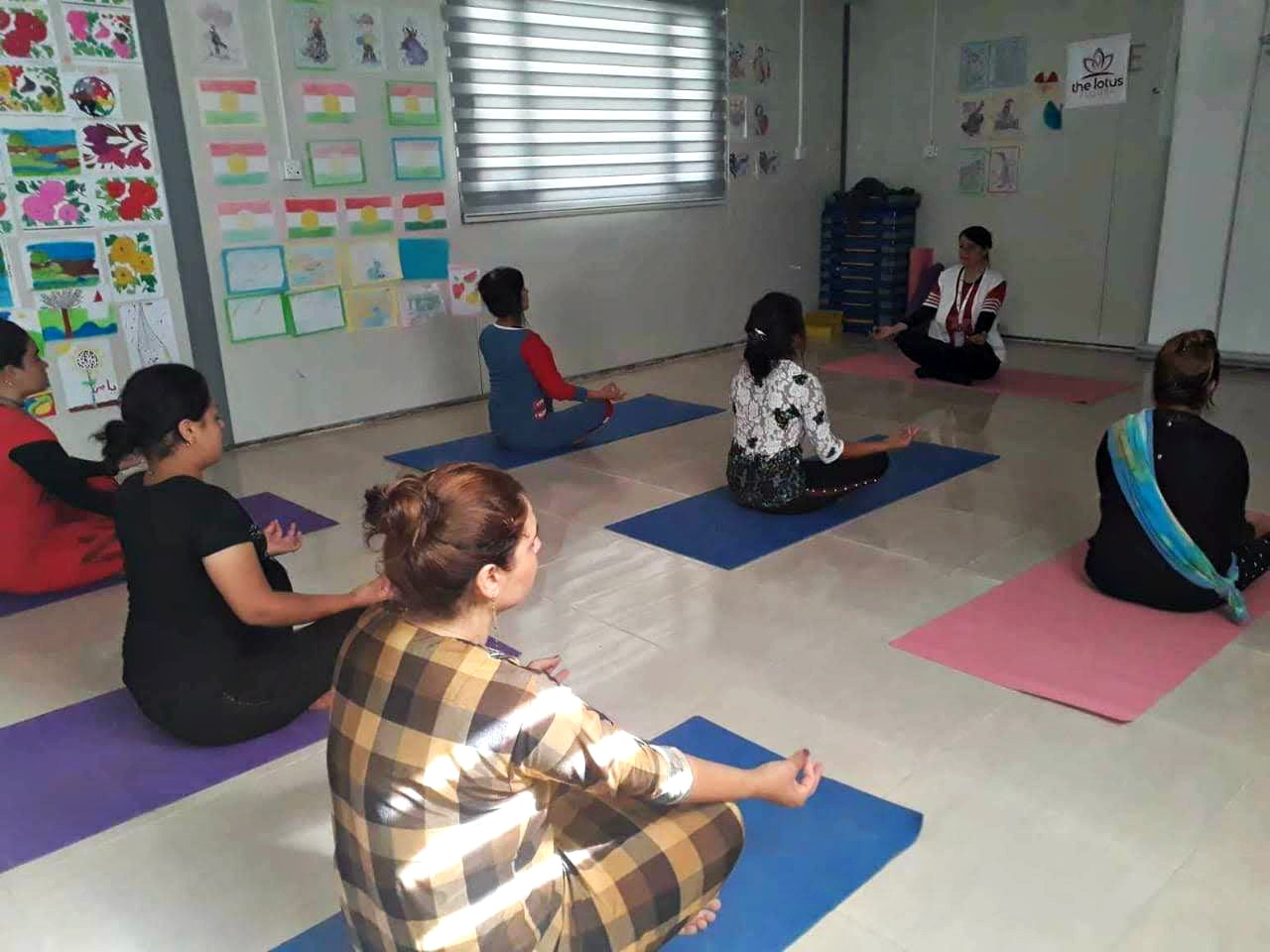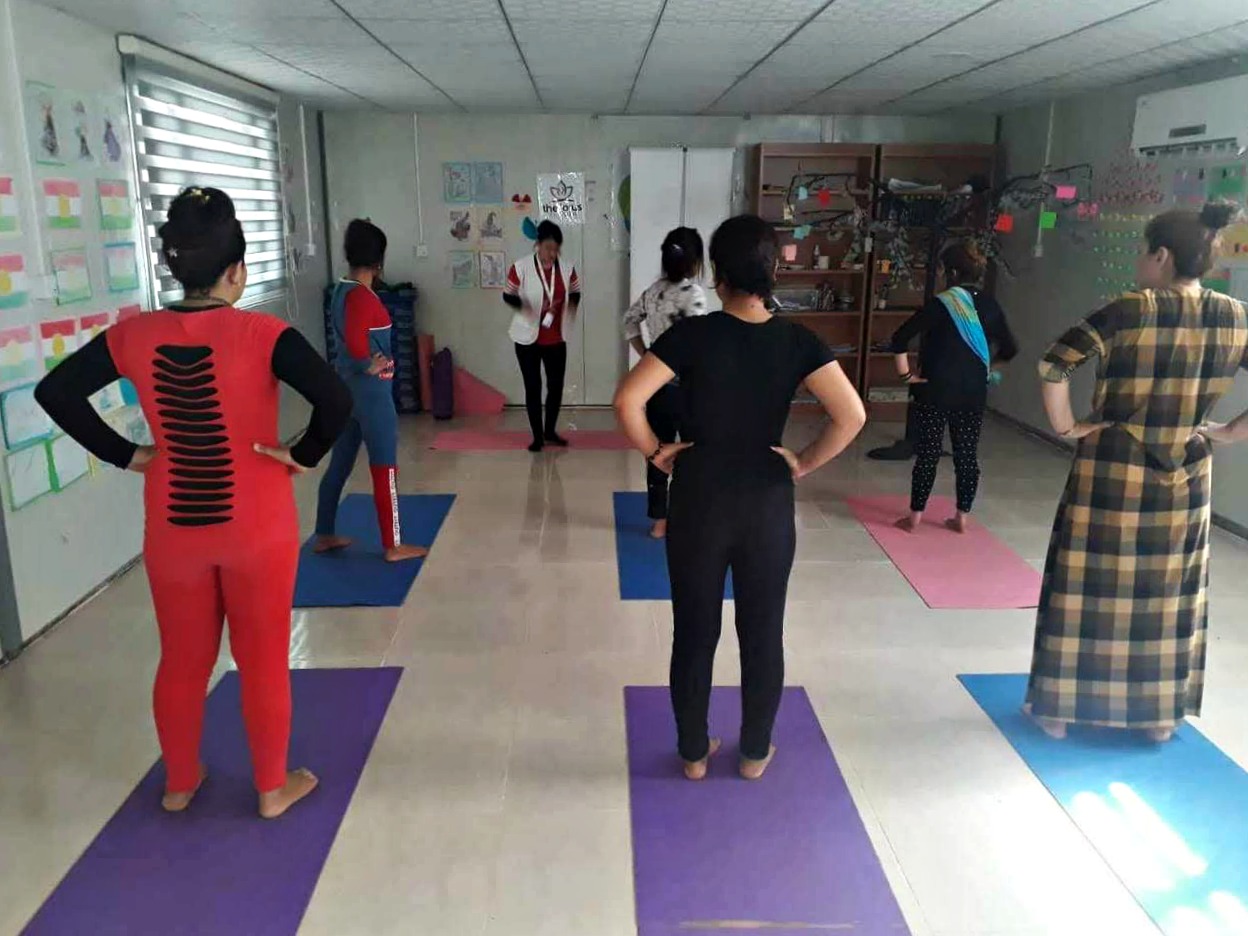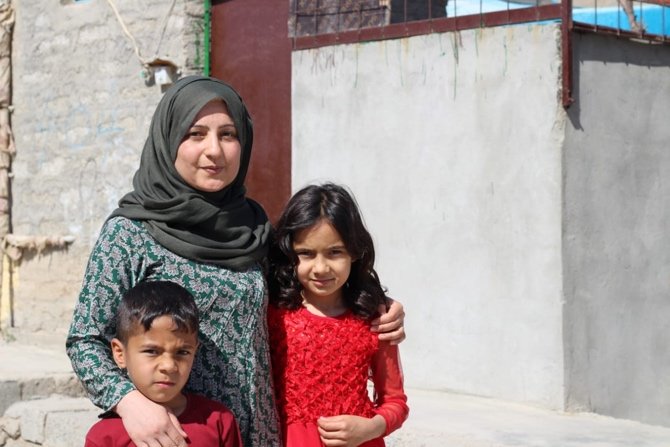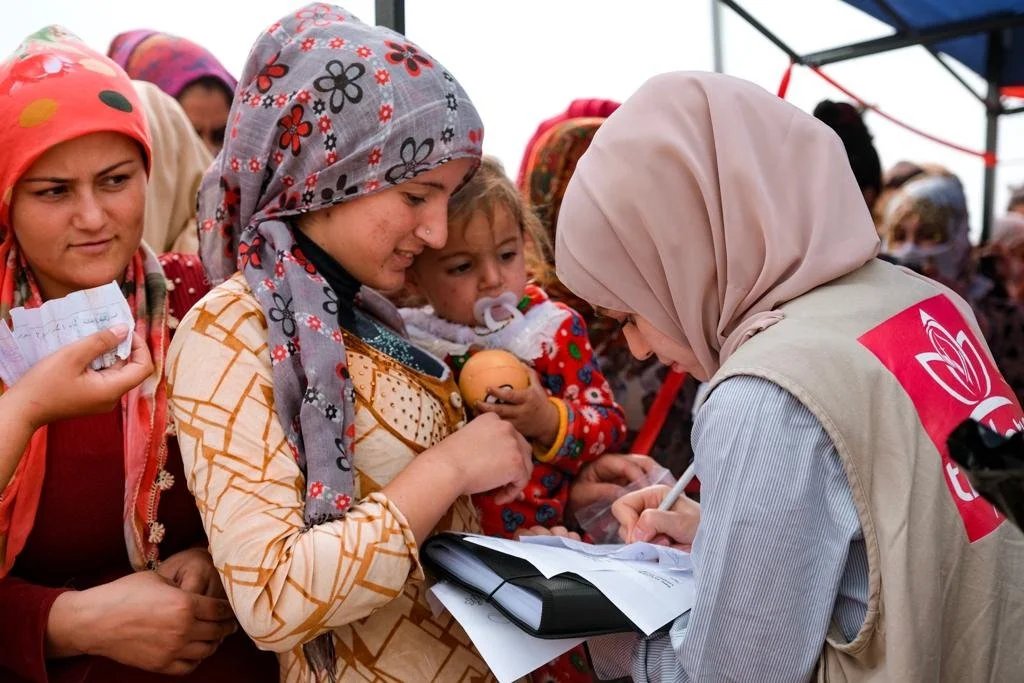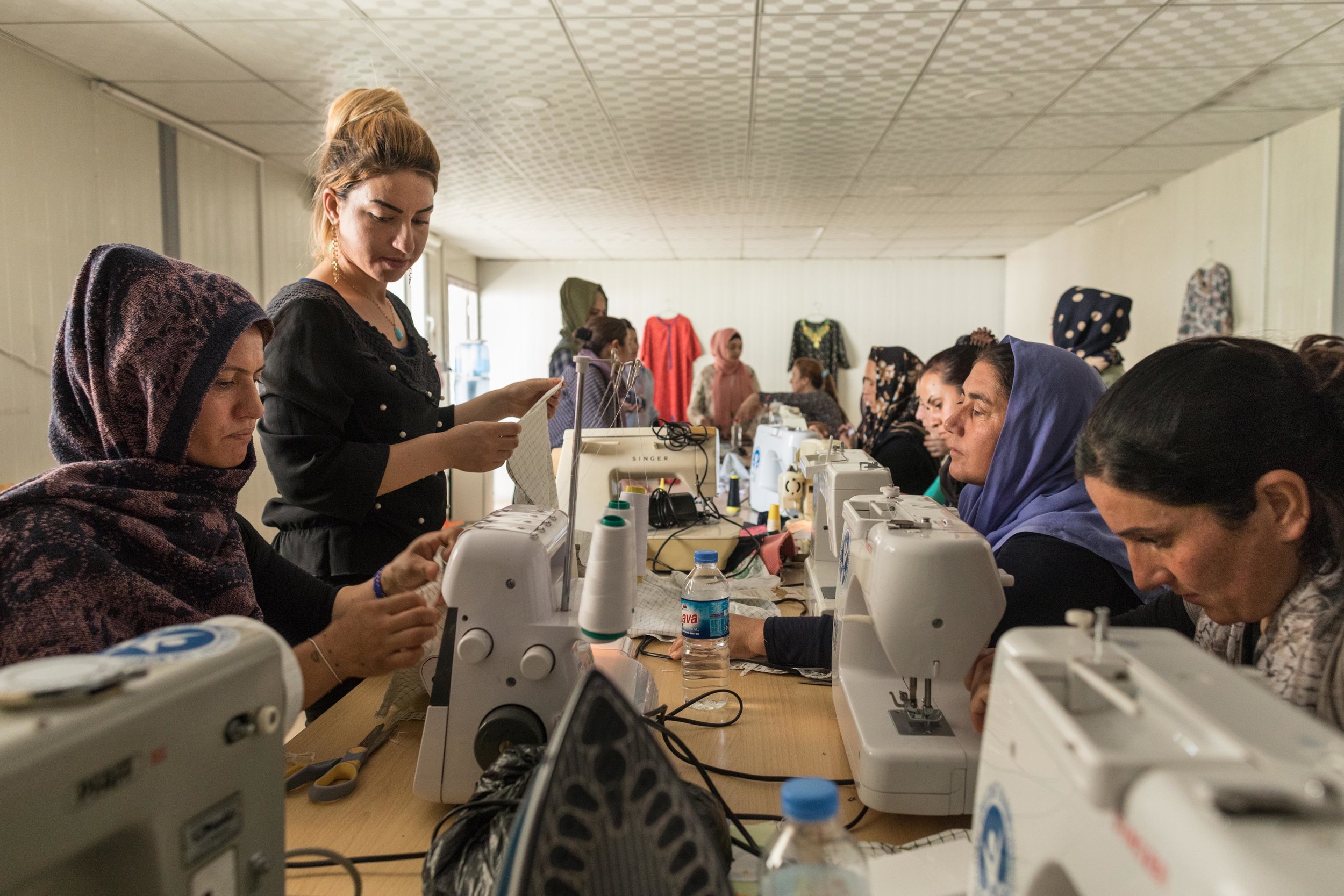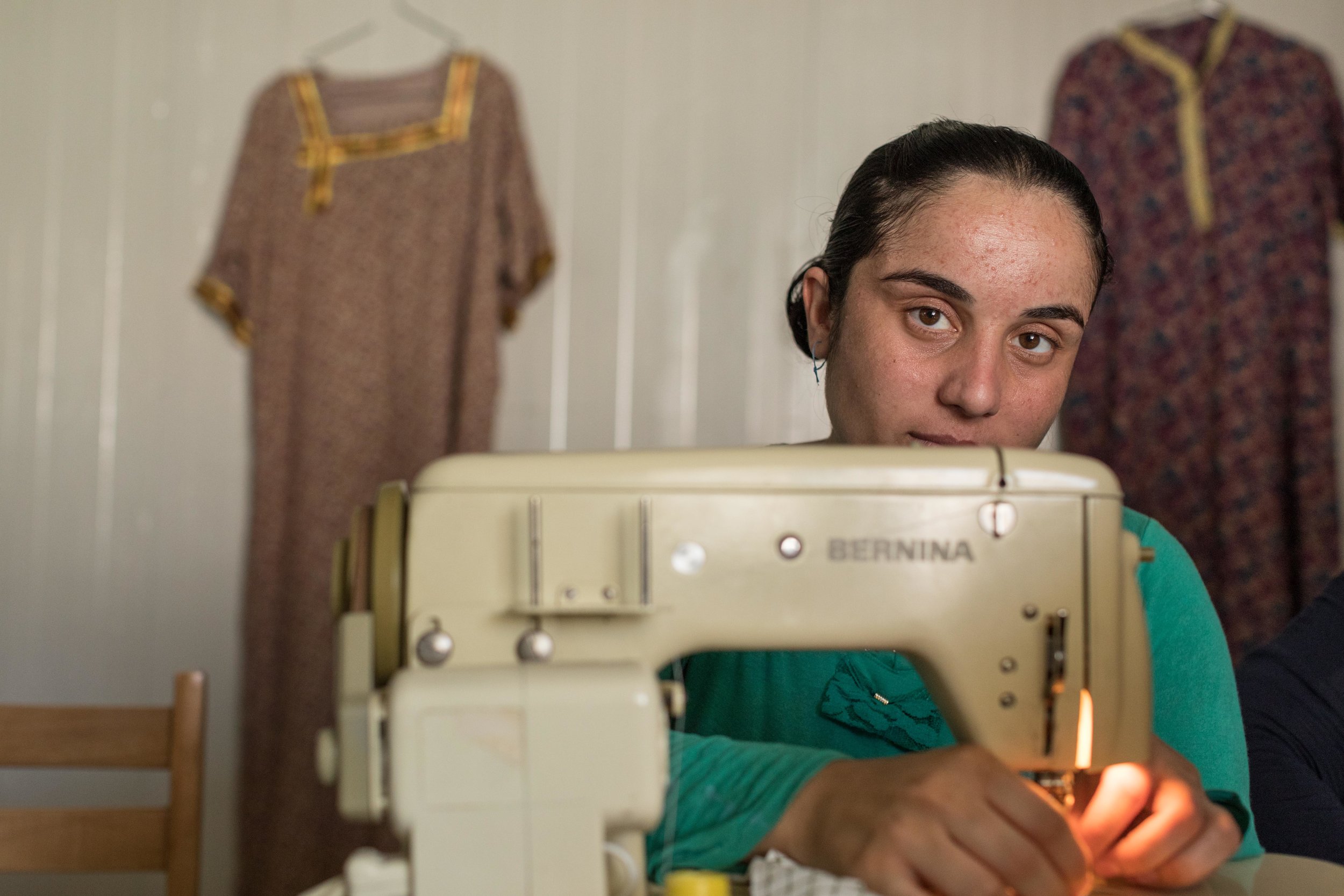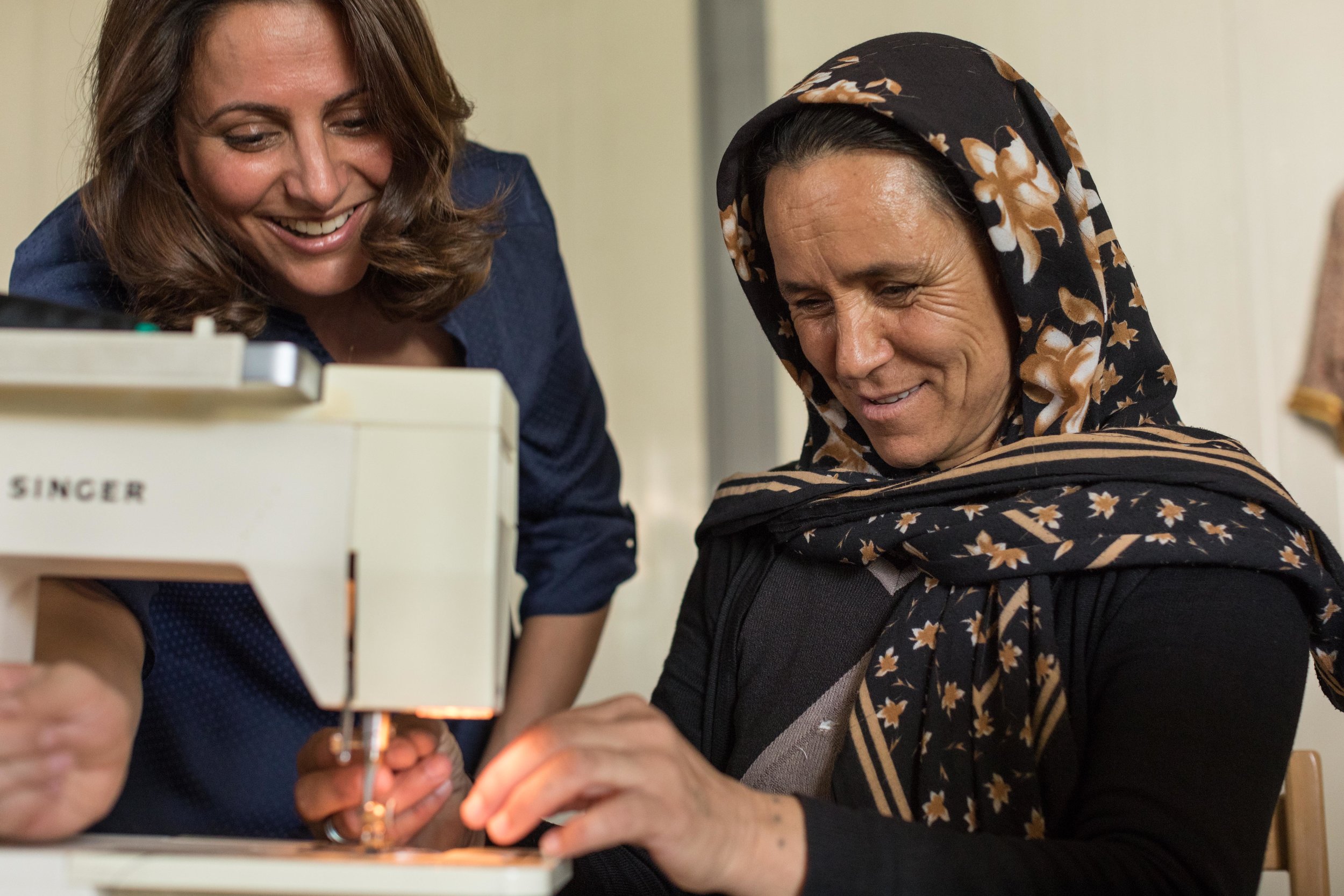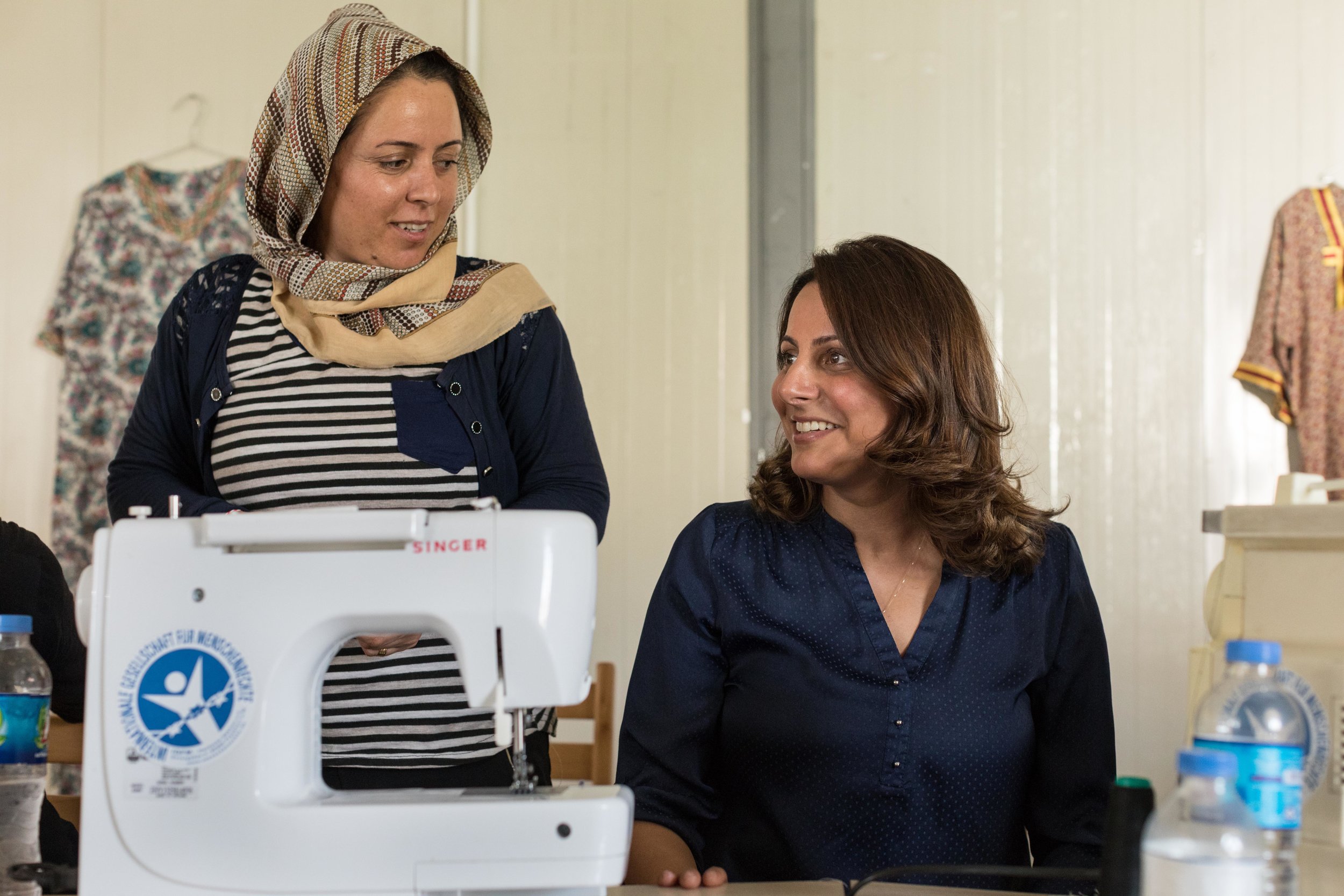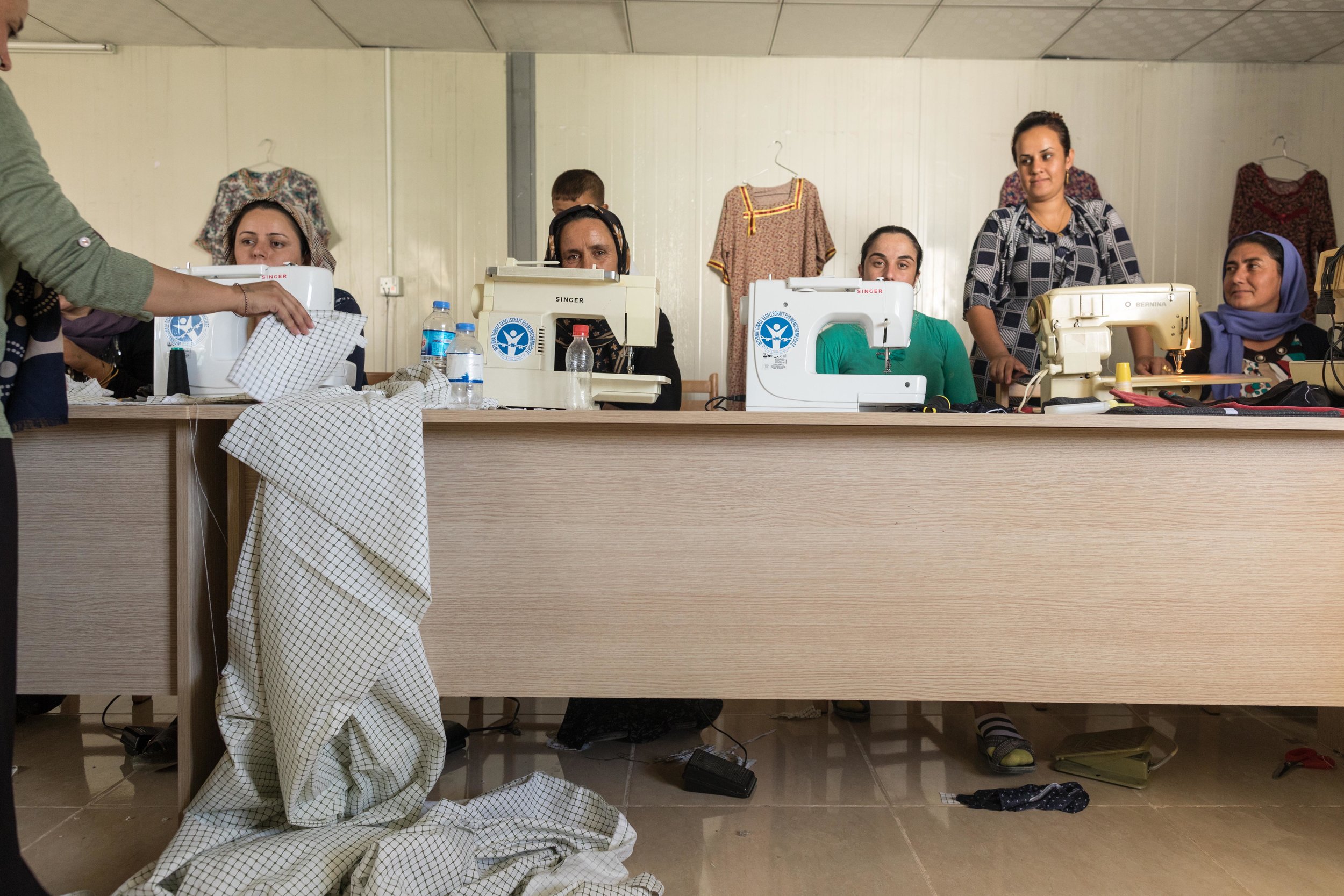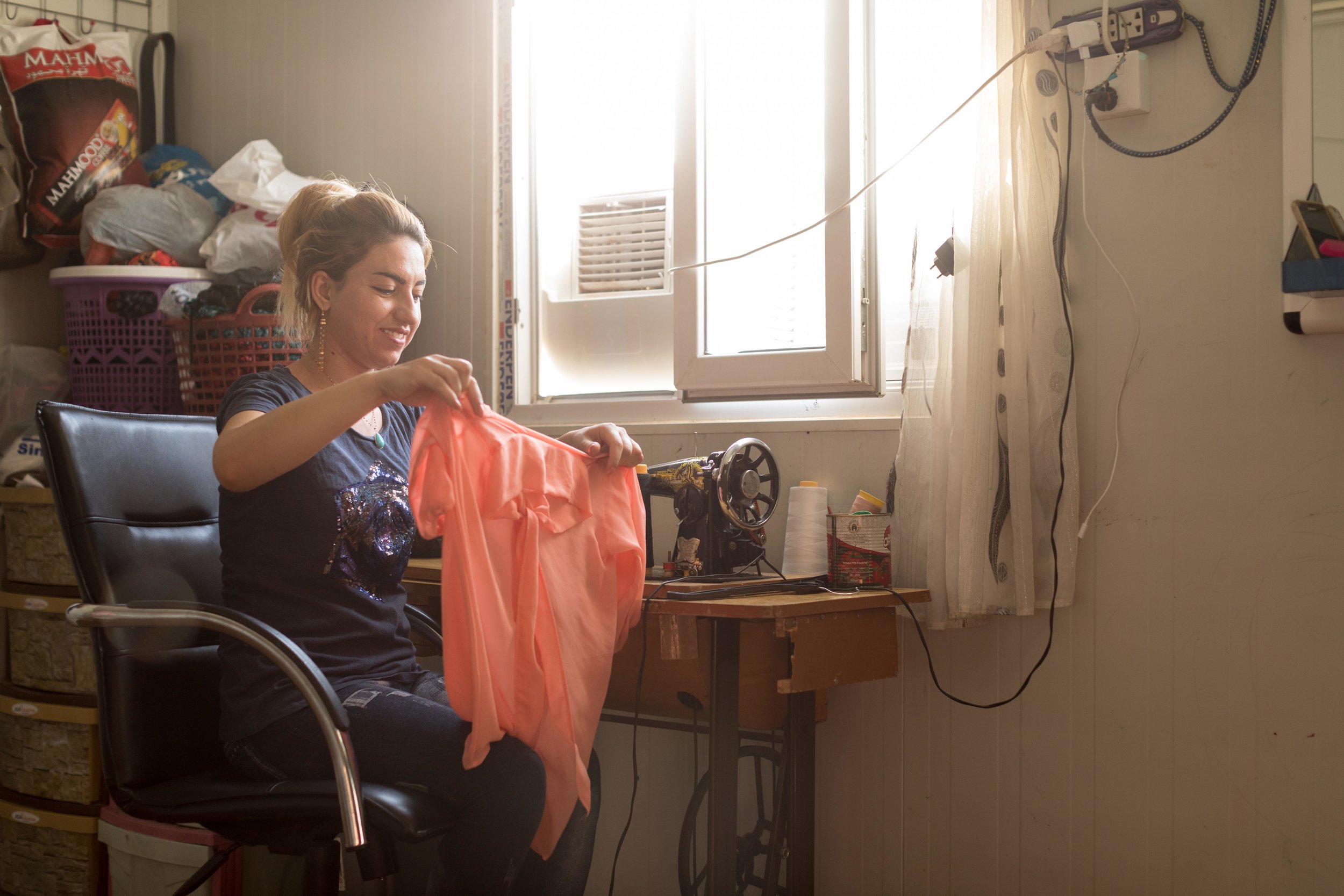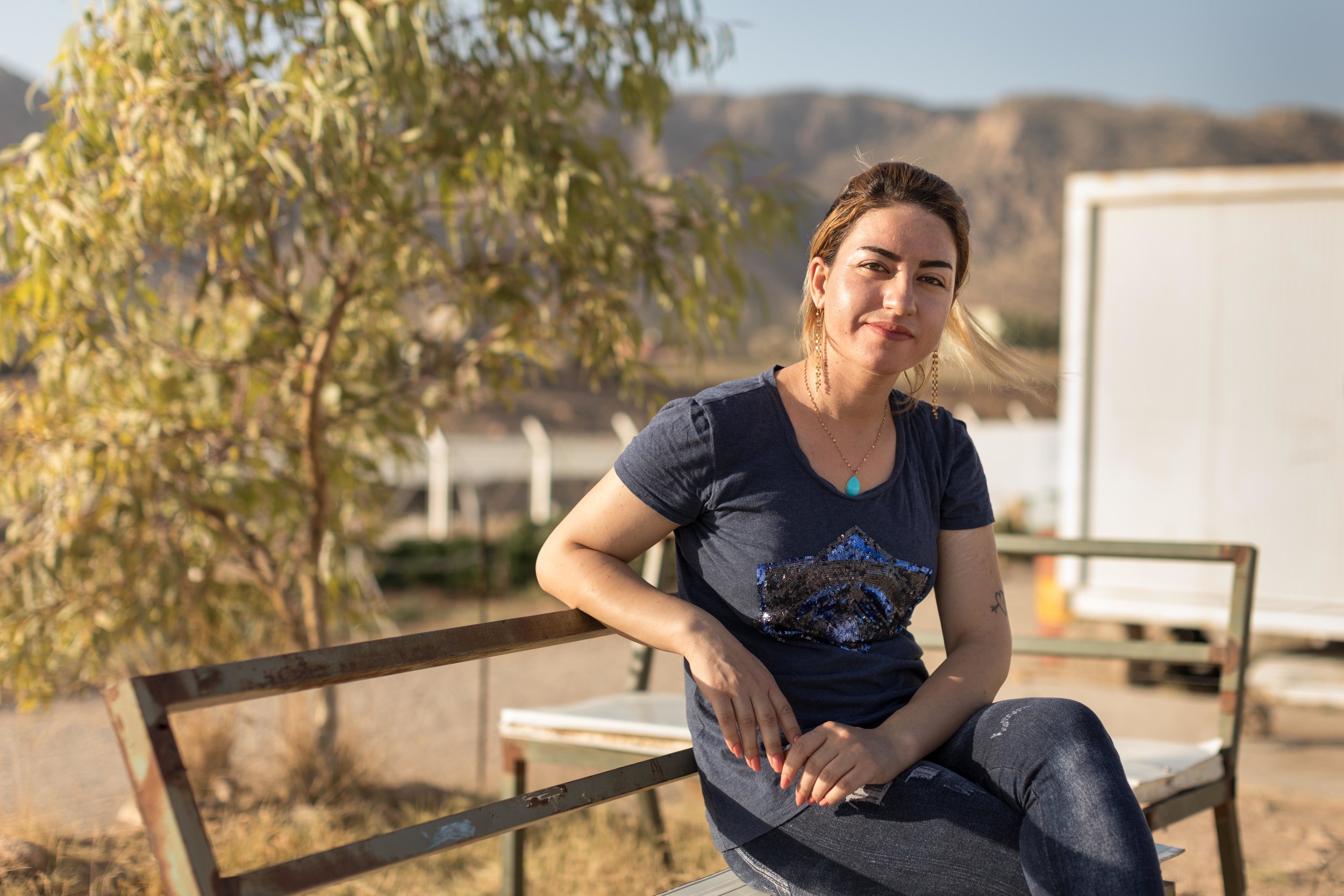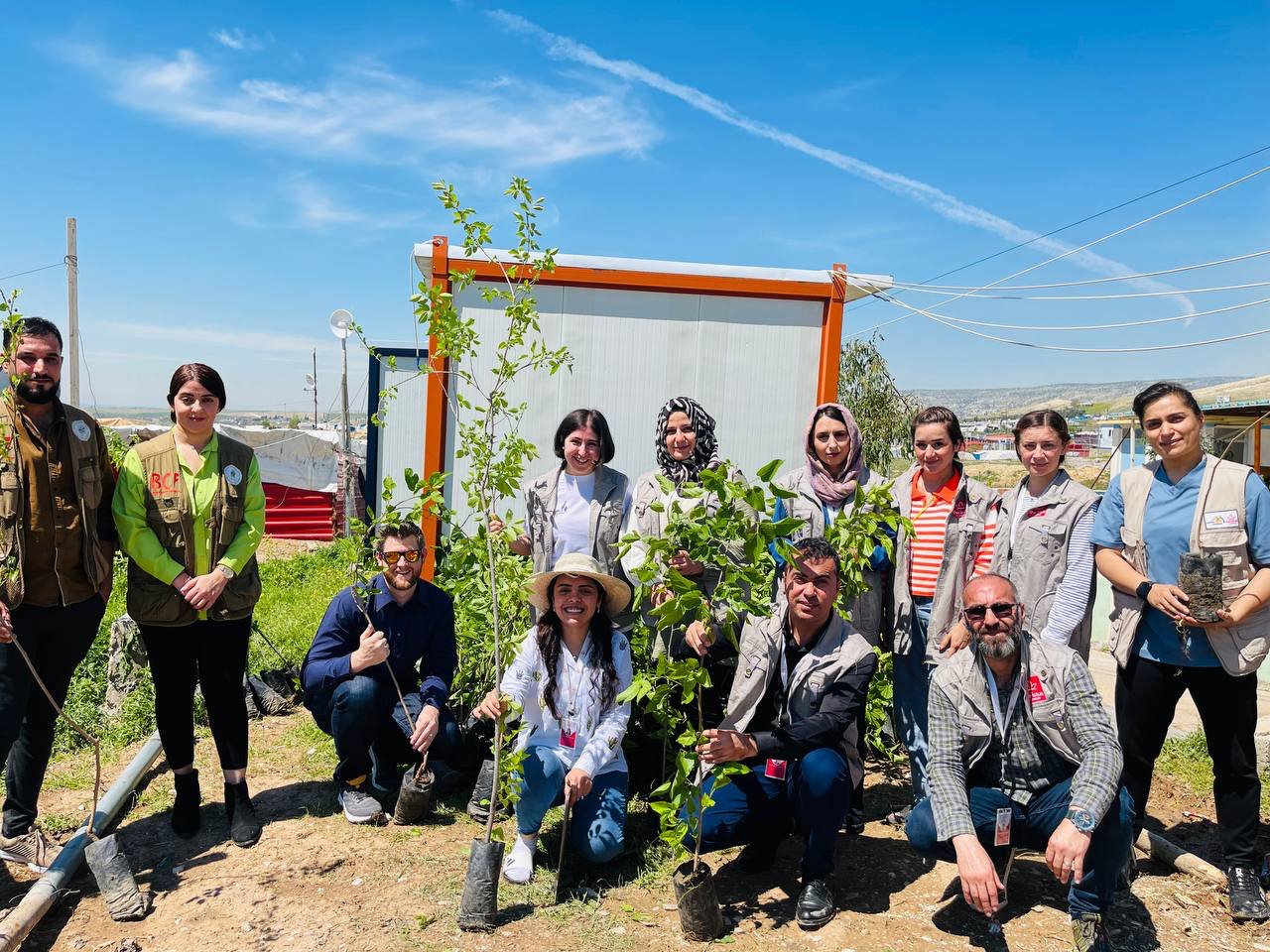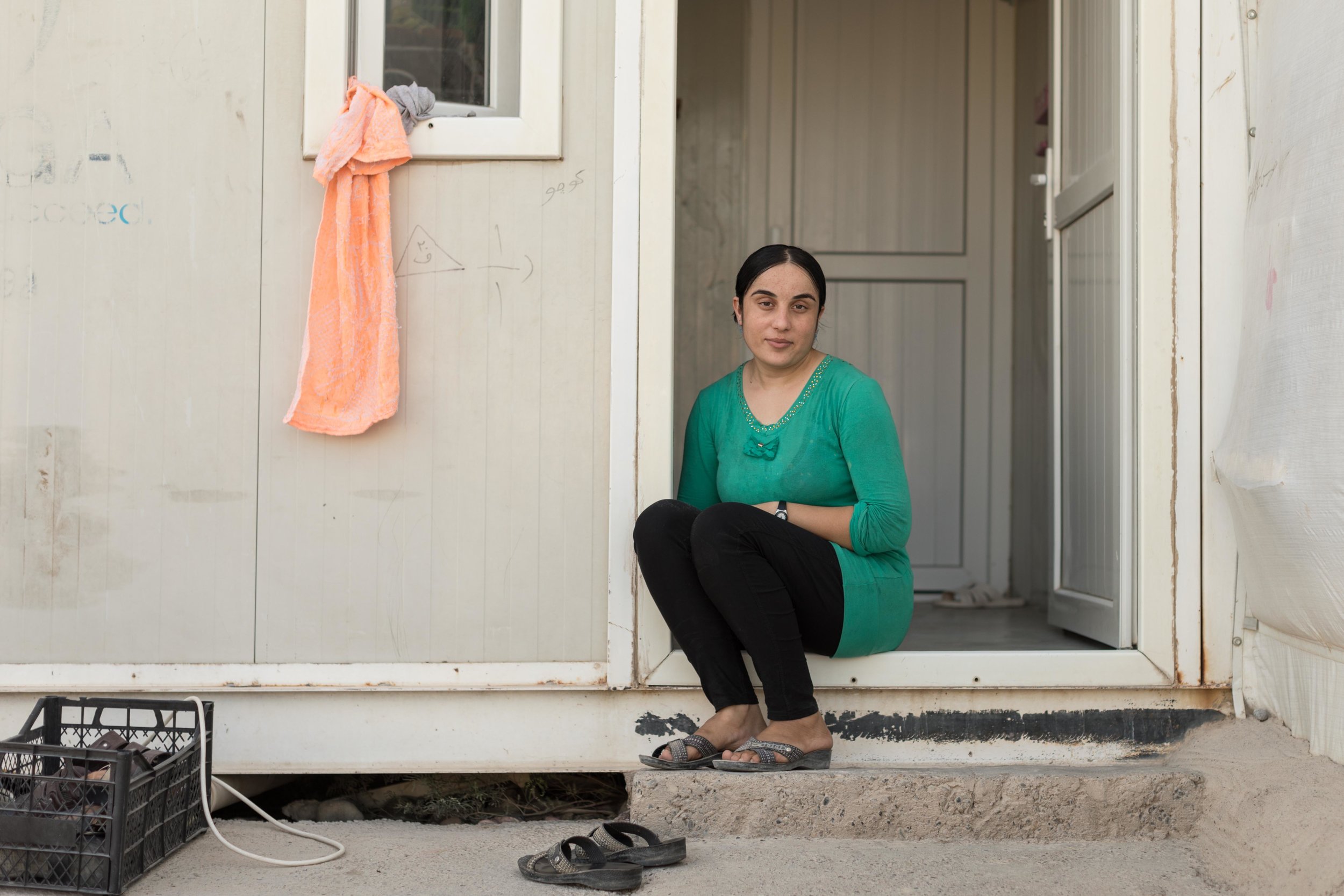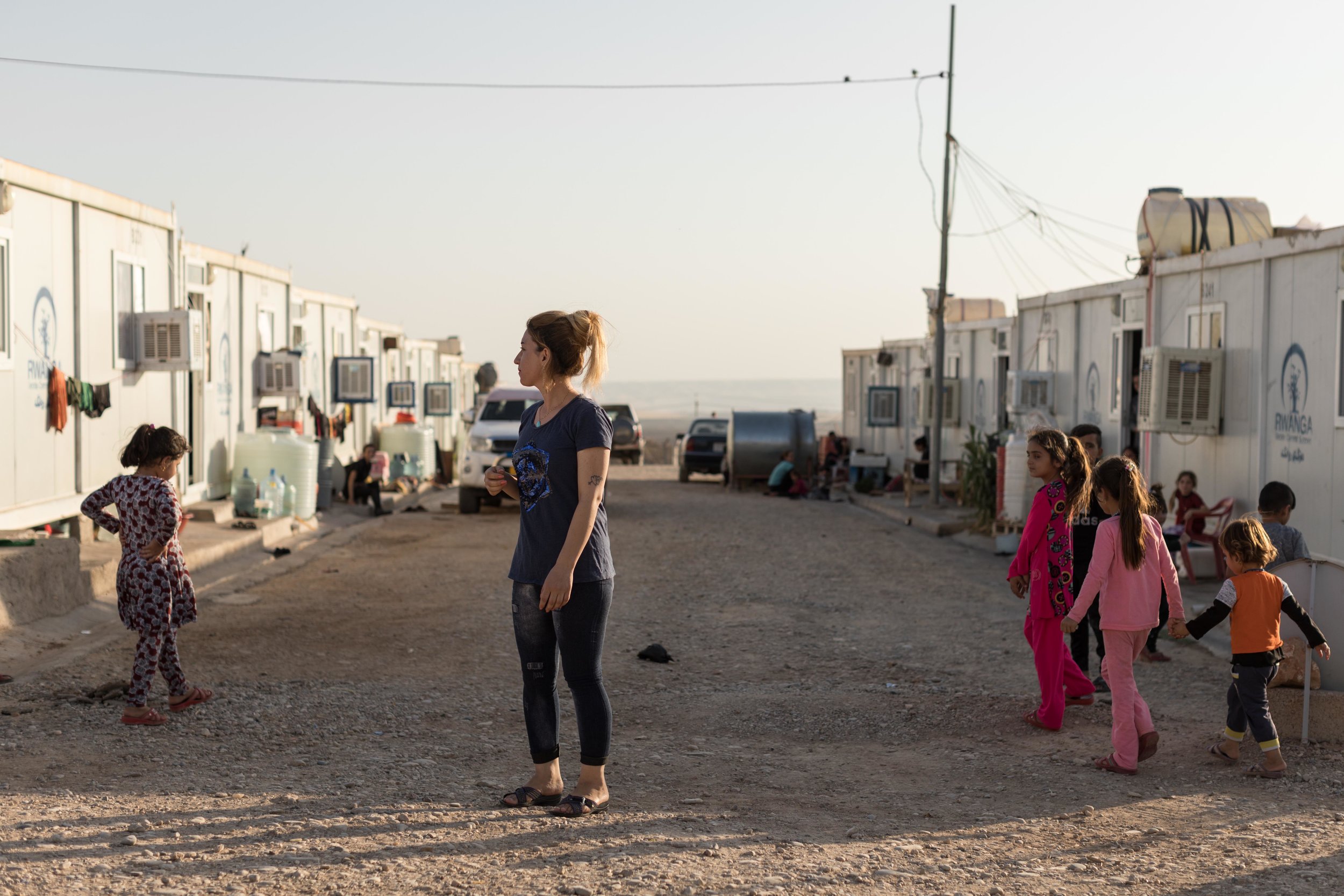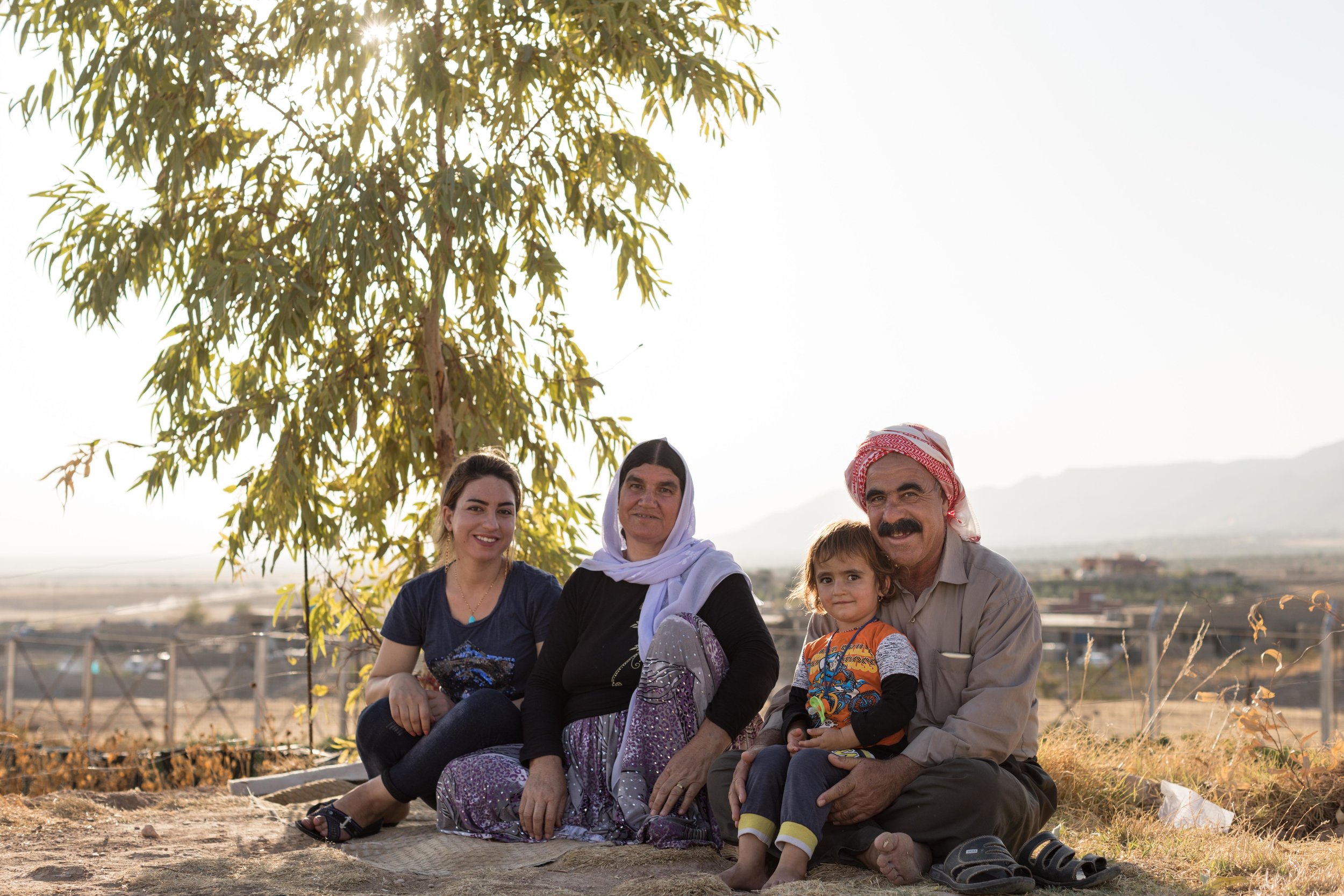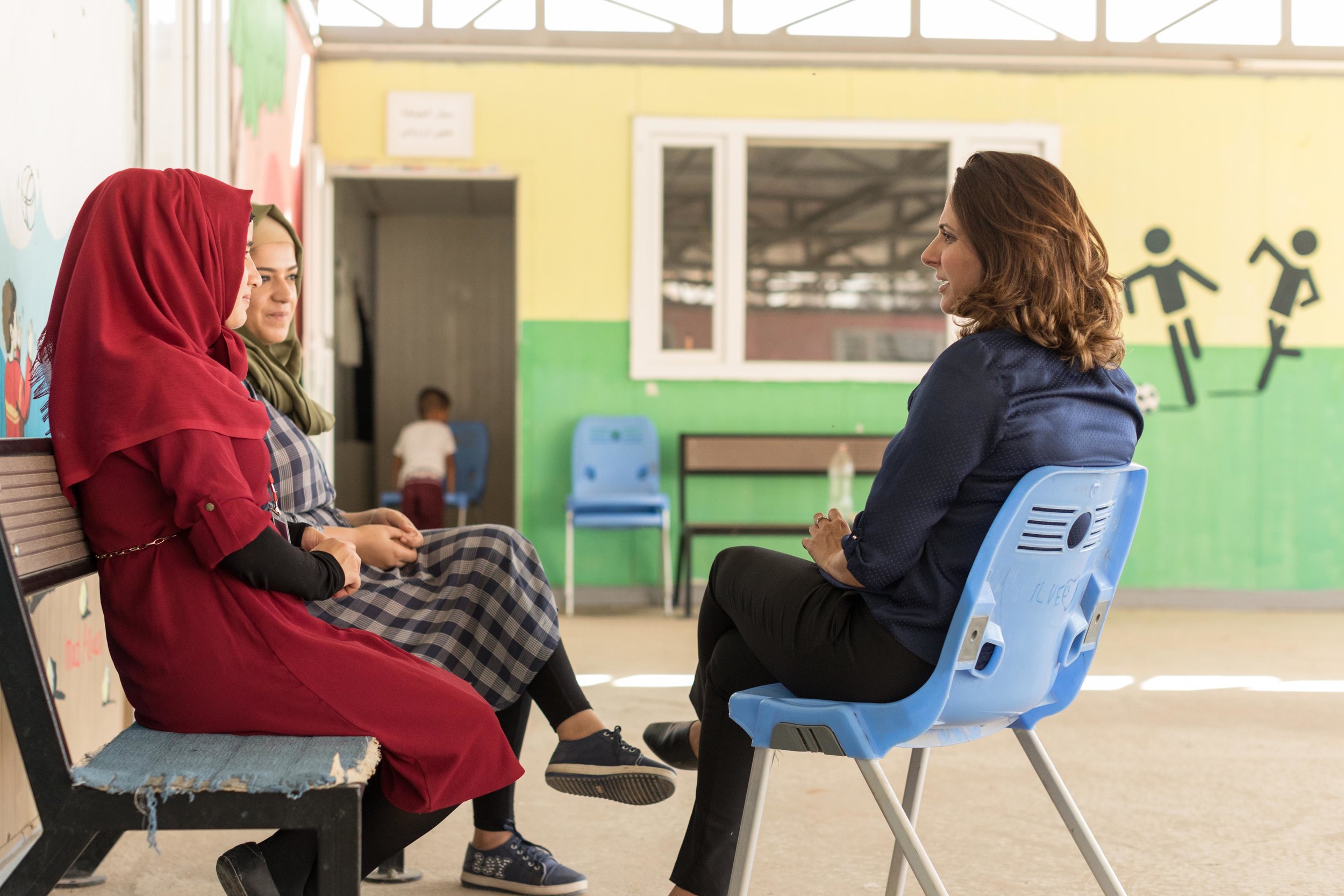Gender-based Violence Awareness
We run regular awareness sessions to help combat gender-based violence, as well as sexual and domestic violence. This is carried out in group settings as well as through door-to-door community visits.
We run regular awareness sessions to help combat gender-based violence, as well as sexual and domestic violence. This is carried out in group settings as well as through door-to-door community visits.
In collaboration with our trusted partners, SEZ and the Federal State of Baden-Württemberg in southwest Germany, we also ran a four-month PSEA (Prevention of Sexual Exploitation and Abuse) project at our three centres at Domiz 2, Essyan and Rwanga camps, which aimed to raise awareness of abuse and improve reporting mechanisms for victims. As part of the initiative, we also conducted PSEA workshops for government institution employees in Duhok.
These kinds of interventions are badly needed, as shown in an assessment of awareness we conducted, which found that 76% of respondents had no idea what Sexual Exploitation and Abuse (SEA) was. In addition, 63% said they believed cases had increased during the pandemic, largely due to isolation, job losses and a critical shortage of resources. But in spite of rising cases, SEA remains desperately under-reported due to fear of stigmatisation and rejection by family and the wider community. There is also a lack of legal support to enable recriminations.
Our vital awareness work also engages men and boys, in order to help change traditional social norms that contribute to SEA.
CASE STUDY
Surian has been living at Essyan camp since 2014, and was badly affected by the ISIS conflict. She has been attending our awareness sessions on gender-based violence and says: “I now know more about my rights, and my obligations as a female to reduce gender-based violence against other women within my community.”
English Language
As English is the main language that is spoken throughout the world, it is becoming an essential skill to learn for professional development in the Middle East. Beginning in January 2017, the Lotus Flower began offering beginner and intermediate-level English courses for women. Each course can last between 1 – 3 months, depending on the needs of the students.
As English is the main language spoken throughout the world, it is becoming an essential skill for professional development in the Middle East. Since January 2017, our centres have offered beginner and intermediate level English courses for women. Each course lasts between one and three months, depending on the needs of the students, and are offered on an ongoing basis.
The main objectives of the English course are to:
Increase level of English language proficiency
Provide a supportive learning environment for our students
Introduce a wide range of vocabulary and expressions that are useful in everyday life and professional environments
The primary impact of English language courses is to facilitate better opportunities for employment; English is a useful skill across a wide array of industries and allows skilled speakers to command higher salaries. Learning English also provides the ability to communicate and travel internationally, and the course itself includes a variety of discussion topics, which helps raise students’ awareness of current events and other topics.
CASE STUDY
Mother Ghazal arrived in camp in 2019, and like so many other women, knew few people and saw little opportunity available to her or her children. However, she then signed up to our English language course, and says: “It has been an amazing thing for me. Through the Lotus Flower centre I have been able to meet other women and girls and take part in many classes. I especially enjoy learning English language, as it helps me develop and acquire new words and learn about letters.”
Despite having no formal education and being illiterate as a child, she is able to ensure her own children have a very different experience. “Now I can help my children in school. I can teach them and help them with their homework. My hope is that they will be able to go to university and have the kind of chances that I never had.”
Awareness Sessions
Our awareness sessions cover all kinds of issues and topics that affect them – including the prevention of gender-based and domestic violence, sexual abuse and exploitation, plus early marriage and human trafficking. Sessions take the form of group discussions, art and music therapy, as well as community outreach and home visits. These sessions are also targeted at men and boys to encourage and enable wider systemic change.
Many women and girl refugees and IDPs are not aware of what behaviours are socially acceptable due to coming from traditional cultures and backgrounds where their basic rights have been badly impinged. Our awareness sessions cover all kinds of issues and topics that affect them – including the prevention of gender-based and domestic violence, sexual abuse and exploitation, plus early marriage and human trafficking. Sessions take the form of group discussions, art and music therapy, as well as community outreach and home visits. These sessions are also targeted at men and boys to encourage and enable wider systemic change.
Our teams additionally provide education and awareness of issues that may require urgent attention – as seen with Covid-19. When the pandemic first broke out, our teams provided information on disease prevention and hygiene – including hand-washing tutorials for children. We also conduct advocacy campaigns to educate community members on mental health issues, and we provide access to a social worker and/or therapist for individualised support and group discussions. When we encounter severe cases, we refer them to partner organisations with the expertise to provide the necessary professional assistance.
CASE STUDY
Syrian widow Fatima was bereft when her grown-up children married and moved away, and she suffered from depressive thoughts. She began attending our awareness sessions on a variety of topics, and says: “These gatherings help me get rid of negative energy, and I am always happy to attend because the centre has such a kind and supportive team.”
Fatima has also found benefits in signing up for other educational classes we offer, and she adds: “I have been participating with my friend, and am very happy to be able to study Arabic and English,” she adds. “I feel good that I am going out to do these things.”
First Aid
Our centres host first aid classes in conjunction with local healthcare organisations – such as the Rwanga Community hospital. Basic first aid skills are demonstrated and then practiced by the participants so that they can use these skills in their daily lives and within the community.
Our centres host first aid classes in conjunction with local healthcare organisations – such as the Rwanga Community hospital. Basic first aid skills are demonstrated and then practiced by the participants so that they can use these skills in their daily lives and within the community. Upon completion, participants receive a first aid medical bag containing supplies that they can use on their own to put their newly acquired skills to work.
CASE STUDY
Nora is an ISIS survivor who came to live in camp after several family members were killed in the war. She lives with her sick mother, and first aid training has given her more confidence that she will be able to help if she faints or has urgent medical needs. “I’m alone with her and I knew that I need to learn the first aid skills so as to be able to help my mother. She is the only one left for me and I want to take care of her very well.”
Lotus Café
In July 2019, we launched the Lotus Flower Café with the support of Asma Khan, founder of Darjeeling Express, in Essyan Camp, which is home to almost 15,000 displaced individuals.
In July 2019, we launched the Lotus Flower Café with the support of Asma Khan, founder of Darjeeling Express, in Essyan Camp, which is home to almost 15,000 displaced individuals. With a shortage of culturally accepted public spaces for women and girls to gather, as well as a lack of employment opportunities, it is difficult for them to rebuild their lives or communities.
The Lotus Café means women and girls can eat healthy, high-quality food in a safe space that has previously not existed in camps. We provide the space, equipment, and supplies, and the women build their cooking skills, teamwork and economic independence. After training in small business management, the female chefs are responsible for managing and operating the café daily. Crucially, the women are able to keep any profits they make, meaning they can support their families and reinvest the money however they see fit.
CASE STUDY
Alya is an ISIS survivor and mum-of-three, who has been a key part of the Lotus Café project. During the atrocities of 2014, she saw many of her friends and relatives taken as sex slaves, and ended up with her family at Essyan camp. Having no income at all before she got involved with the Lotus Flower, she is now able to provide for her family, and says: “Working in the Lotus Café means I’m able to help my parents and feed my three kids. It makes me happy, and it feels good to be self-empowered.”
Hairdressing Sisters
The Lotus Flower will soon be launching our new livelihood programme, Hairdressing Sisters, to further economic and employment opportunities for displaced women in the Kurdistan Region of Iraq.
Our livelihood programme Hairdressing Sisters was designed to further economic and employment opportunities for displaced women. After conducting a needs and skills assessment, female respondents requested training in hairdressing as there were no women-only salons in the camps and they are unable to travel to nearby cities due to lack of transportation and financial resources.
In partnership with Gareth Smith, a London-based freelance hair stylist with 20 years in the industry, we trained women to become hairdressers in each of our centres, with the aim that they would then be able to earn an income based on their skills. The space, equipment, and training were all provided, enabling them to learn everything they needed to know about hairdressing. After graduating from the course, they became able to offer their services to their community and seek financial independence and security.
Yoga, Sports & Meditation
Our centres offer regular yoga and meditation classes for women and girls, in which they are taught how to incorporate these exercises into their daily lives to help them heal physically and mentally.
Most experts agree that trauma lives in the body. Practicing yoga and meditation allows participants to engage with body-centered and mindfulness techniques to mitigate these physical manifestations of trauma and learn to engage their parasympathetic nervous systems to slow breathing, drop their heart rate, and lower their blood pressure. These effects contribute to overall well-being and promote mindfulness as a tool to combat stress.
Our centres offer regular yoga and meditation classes for women and girls, in which they are taught how to incorporate these exercises into their daily lives to help them heal physically and mentally.
Additionally, we offer regular women’s fitness classes, which provide simple but effective ways of staying fit and active to improve their overall health and wellbeing. These sessions are conducted in culturally sensitive ways.
Journalism
During the program, the girls worked together to produce a magazine called Afrandin (meaning Creation), which they wrote, edited and designed. At the beginning, some of the Yezidi and Muslim girls would not even sit together, but by the end, they were working in harmony and building lasting friendships. One of the girls has since even been hired at a Yezidi publication.
One of our projects saw young women get the chance to learn journalism skills in an exciting collaboration with the non-profit DAK. The project was funded by the International Organization for Migration (IOM), and brought together a diverse group of 15 girls from Muslim, Yezidi, and Christian communities to develop media awareness and practices.
The girls had been living in fiercely divided communities since the ISIS invasion in 2014, and were initially wary of mixing. But our programme, called Fostering Social Cohesion and Peacebuilding through Female-Led Journalism, tackled this destructive narrative, championing the idea of community integration.
During the project, the girls worked together to produce a magazine called Afrandin (meaning Creation), which they wrote, edited and designed. At the beginning, some of the Yezidi and Muslim girls would not even sit together, but by the end, they were working in harmony and building friendships. One of the girls was later hired at a Yezidi publication.
Not only did the girls learn vital communication skills to express themselves through magazines, newspapers, radio, and social media, but they also learned how media can bring about social unity rather than destruction. As fundamental drivers of change, they also recognised how their role in peacebuilding benefits their families, communities and ultimately their whole country.
We also incorporate many of the activities from the Journalism project into our Peace Sisters programme, which includes soft skills training in communications for women and girls.
CASE STUDY
One of the girls, Kheria, said of the Journalism project: “The training was very good. I learnt a lot about social cohesion. The most amazing part was the activities that will make us never forget the information.” Another participant, Jomana, added: “Women have to give priority to education, it’s the most important thing in life.”
Suicide Prevention
Our project provides mental health support for youths and their families, in groups and individually, with our trained psychologists, and enables them to participate in activities that build their self-confidence and reduce suicidal feelings. Participants are also encouraged to practice music, art and yoga to combat negative thoughts.
According to UNHCR, one in five people in displaced communities suffer from conditions of clinical concern. Displaced Yazidis in Rwanga and Essyan camps still bear deep mental scars from the ISIS attacks of 2014, and Covid-19 has profoundly worsened their plight – with lockdowns leading to increased GBV, rights abuses and mental health issues. A sense of hopelessness pervades amongst youth groups, who have little to do and extremely limited opportunities. In a post-Covid-19 assessment we conducted, 85% of respondents said the pandemic has worsened their mental wellbeing and 80% specified that access to a therapist would help.
Addtionally, since late 2020, youth suicide rates have increased in camps. According to authorities in Rwanga and Essyan, there were 45 suicide cases (attempts and deaths) in 2021 – the majority being young girls. And according to a Lotus Flower psychologist, eight out of 10 females in group sessions express hopelessness for the future, with four saying they have had suicidal thoughts and/or attempted suicide.
Our project provides mental health support for youths and their families, in groups and individually, with our trained psychologists, and enables them to participate in activities that build their self-confidence and reduce suicidal feelings. Participants are also encouraged to practice music, art and yoga to combat negative thoughts.
Farming Sisters
The majority of camp residents are Yezidi and have a farming background that spans generations. As the women’s centre includes a plot of unused land, we wanted to facilitate an opportunity for women to use skills that have been taught to them by their ancestors while also providing an income to support their families. The women have recently started to garden and plant seasonal vegetables.
After opening the doors to our third women’s centre in Essyan Camp, the Lotus Flower launched another livelihoods programme, Farming Sisters. The majority of camp residents are Yezidi and have a farming background that spans generations. As the women’s centre includes a plot of unused land, we wanted to facilitate an opportunity for women to use skills that have been taught to them by their ancestors while also providing an income to support their families. The women have successfully used the land to garden and plant seasonal vegetables.
Throughout the year, they manage the project and sell fresh produce to their neighbours, the surrounding community, and even the Lotus Café. As with all of our livelihood programmes, the women retain 100% of their profits.
Our Farming Sisters have also taken over eight greenhouses which we renovated at Essyan camp in 2023, meaning they can grow fresh vegetables to feed their families and earn independent incomes. Additionally, at Domiz 2 camp, we recently established a community garden featuring raised beds in which women can now grow vegetables and herbs.
Computer training
To complement the language courses and provide additional professional skills, the Lotus Flower provides computer training courses for women and girls. This training provides a base level of computer skills, which are a valuable asset in most modern professions. Most of the women and girls attending these courses had never used a computer before, so the instructors start from the basics, including turning the computers on and off, opening files, and using office software.
Our computer training courses for women and girls provides a base level of computer skills, which are a valuable asset in most modern professions. Most of the women and girls attending these courses have never used a computer before, so the instructors start from the basics, including turning the computers on and off, opening files, typing skills, and using office software.
Having lacked the opportunity to work with computers before, many of the women in our courses conducted so far were very excited for the opportunity to learn, and all of them graduated with the ability to work with computers successfully, particularly focusing on skills in Microsoft Word. As of the end of 2017, 40 women and girls in the Rwanga Community had graduated the computer course and were able to achieve basic computer skills which they could practice every day on community center computers.
Holiday and Community Events
The women and girls we support come from diverse sectors, ethnic groups and backgrounds, and we strive to recognise key cultural events and holidays. We believe it is vital to respect family traditions, friendship, hospitality and community events – such as Ramadan.
The women and girls we support come from diverse sectors, ethnic groups and backgrounds, and we strive to recognise key cultural events and holidays. We believe it is vital to respect family traditions, friendship, hospitality and community events – such as Ramadan.
Occurring once a year and as prescribed by Islam, adult Muslims fast from dawn to dusk, if their health permits. After the sun sets, the day-long fast is broken by Iftar, the evening meal usually shared with family or other community members. With many displaced people residing in camps, it can be a hard time of year for those who celebrate Ramadan as they are away from their home and family members. In collaboration with our partners, we have previously hosted an Iftar meal for Muslim and Yezidi women, serving as an integration platform between the two communities. Regardless of background, sharing holiday meals and the traditions surrounding them builds friendship, community and a sisterhood. It is also a peacebuilding process, which fosters religious and cultural understanding.
Additionally, in recent years we have raised funds around Ramadan so that mothers can buy their children celebratory outfits for Eid – which marks the end of the holy period. Over the past two years we have been able to take hundreds of children from three camps on shopping trips to choose their own special clothing, footwear and accessories.
CASE STUDY
Nareeman, pictured with her three children, was one of the women we reached through one of our successful Ramadan campaigns. A Syrian refugee and single mother, she heartbreakingly lost her husband to a heart attack many years ago, and has since been trying to raise her children in the best way she can. Our appeal enabled Nareeman to buy her children Eid outfits to celebrate the end of Ramadan, putting a big smile on their faces.
Community Outreach
Our teams provide door-to-door outreach services for families and community members – many of whom are physically unable to leave their accommodation or travel to our centres. The outreach covers all kinds of essential topics – including first aid measures in conjunction with local healthcare organisations, as well as family planning for women, gender-based violence, sexual abuse and exploitation and human trafficking.
Our teams provide door-to-door outreach services for families and community members – many of whom are physically unable to leave their accommodation or travel to our centres. The outreach covers all kinds of essential topics – including first aid measures in conjunction with local healthcare organisations, as well as family planning for women, gender-based violence, sexual abuse and exploitation and human trafficking. We deliver this outreach to men and boys as well as women and girls, as we believe it is important that everyone in the community has knowledge of issues likely to affect them and their families.
Emergency Response
We act swiftly to provide emergency response to any issues or crises, as well as provide information on regional and national public health guidelines. As one example, we provide warm coats and clothing to vulnerable community members during freezing winter weather, and during the Covid-19 pandemic, we provided vital information about hygiene measures, social distancing and lockdown regulations, as well as advice on handwashing techniques for children.
We act swiftly to provide emergency response to any issues or crises, as well as provide information on regional and national public health guidelines. As one example, we provide warm coats and clothing to vulnerable community members during freezing winter weather, and during the Covid-19 pandemic, we provided vital information about hygiene measures, social distancing and lockdown regulations, as well as advice on handwashing techniques for children. Meanwhile, our Sewing Sisters made fabric face coverings for the community, which were in critically short supply. We also quickly shifted much of our programming to remote delivery where face-to-face gatherings were not possible – with mental health therapy conducted by our psychologists via phone, WhatsApp and Viber. Awareness sessions on gender-based violence also shifted to remote delivery, reaching up to 200 people daily, as well as language and literacy classes.
Girls Not Brides Partnership
The Lotus Flower has partnered with Girls Not Brides and joined their global network of civil society organisations that are committed to eliminating child marriage.
The Lotus Flower has partnered with Girls Not Brides and joined their global network of civil society organisations that are committed to eliminating child marriage.
According to Girls Not Brides, child marriage is any formal marriage or informal union where one or both of the parties are under 18 years of age. Every year, 12 million girls are married before they are 18 years old.
In Iraq, the legal age for marriage is 18 for both boys and girls but a girl can marry when she is 15 years old with parental consent. Poverty, protracted violent conflict, and religious and social traditions tend to be drivers of child marriage. Economic hardship, driven by decades of war and sanctions, has increased the number of child brides. According to UNICEF, 1 in 5 girls are married before the age of 18.
The Lotus Flower Women's Centres provide awareness and educational sessions on the impact of child marriage. Considered a human rights violation, child marriage deprives girls of their freedom and rights to education, health, and safety. They are more likely to experience health complications and domestic violence. Child marriage also enables the continuation of poverty through generations. By offering awareness sessions to women and girls in the communities where we live and work, The Lotus Flower aims to encourage women and girls to seek limitless opportunities through education, job training, and building their own community.
Empowerment Sessions
Our centres host weekly awareness sessions on topics such as early marriage, domestic violence, women's health issues, the importance of education for women and girls, and gender-based violence.
The Lotus Flower Women's Centres provide a safe and supportive space to host a variety of activities to complement our adult education and vocational training programs. One of our aims is to offer regular awareness sessions on gender equality in order to combat discrimination and violence against women and girls.
Our centres host weekly awareness sessions on topics such as early marriage, domestic violence, women's health issues, the importance of education for women and girls, and gender-based violence.
In collaboration with our partners, the sessions are conducted by a specialist in that topic area and provide an opportunity for women and girls to discuss important gender issues that are considered taboo. Our community members are able to ask questions and discuss gender issues while finding creative solutions together and building a network of friendship and support. The sessions aim to crease their level of awareness, promote confidence, and provide support for self-empowerment.
Women’s Centre
The Lotus Flower operates a women’s center that provides a safe and welcoming space for women while offering various activities and training programs. One of the aims of the center was to provide indirect psycho-social support for women who had experienced violence and/or sexual trauma at the hands of ISIS foot soldiers. Coming together to attend these classes has enabled the women to reconnect and create a network of support and friendship.
The Lotus Flower operates a women’s center that provides a safe and welcoming space for women while offering various activities and training programs. One of the aims of the center was to provide indirect psycho-social support for women who had experienced violence and/or sexual trauma at the hands of ISIS foot soldiers. Coming together to attend these classes has enabled the women to reconnect and create a network of support and friendship.
Some of the class offerings have included yoga, music lessons, professional beauty / make up, and first aid training. The center also offers regular awareness sessions to discuss important topics that affect the community’s daily life, such as health, social, and legal issues.
Impact
40 women have attended 2 first aid classes taught in conjunction with the Rwanga community hospital and learned skills they can apply in their daily lives. The women all received first aid kits at the end of the course, which contain basic first aid supplies so that the skills learned in the course can be put into practice when necessary.
Music lessons have been taught in one course so far, to 10 girls over the course of 2 months. The attendees went from no experience with the instruments to sufficiently skillful to put on a recital, much to the surprise and delight of the other women who attended, and they plan to continue to play at future celebrations at the women’s center.
Success Stories
Gulistan Sabri Alyas, 25, participated in the beauty course and enhanced her skills in hair dressing and makeup, even helping to teach others during the course. She now runs a small salon out of her home and earns an income from these skills every month.
Nora Mato, 30, is an ISIS survivor, many of whose family members were killed, and she now lives alone with her sick mother. Her first aid training has given her more confidence that she will be able to help her mother if she faints or has urgent medical needs. “I’m alone with my mother and I knew that I need to learn the first aid skills so as to be able to help my mother, she is the only one left for me and I want to take care of her very well.”
Khokhe Shivan Haji is 25, married, and has 2 children. She also attended the first aid course and was particularly interested in the talk on breast cancer. “I went home and practiced what the teacher told me [and] I noticed that there [was] a small swilling on one of my breasts that existed before. I never cared about it….[but] now I became worried,” she told us. She went to the doctor the next day and was given a prescription to take immediately. She’s now recovering well and visits the doctor on a regular basis.
Survivor Support
The Lotus Flower provides ad hoc support to survivors of genocide inside and outside of Kurdistan. The programming can include awareness training sessions, such as legal issues and women’s rights, as well as professional psychological support. The Survivor Support program creates custom responses to individual cases based on the situation.
The Lotus Flower provides ad hoc support to survivors of genocide inside and outside of Kurdistan. The programming can include awareness training sessions, such as legal issues and women’s rights, as well as professional psychological support. The Survivor Support program creates custom responses to individual cases based on the situation.


